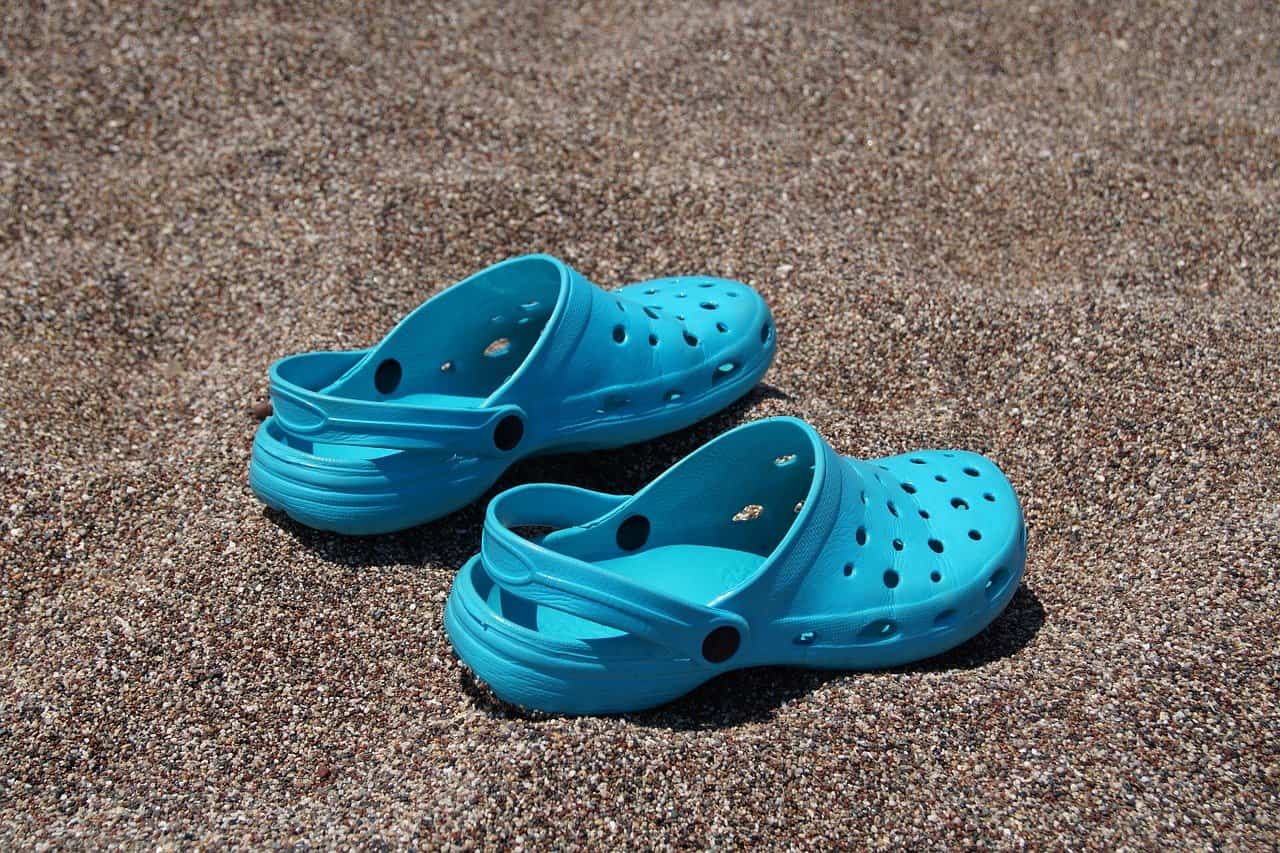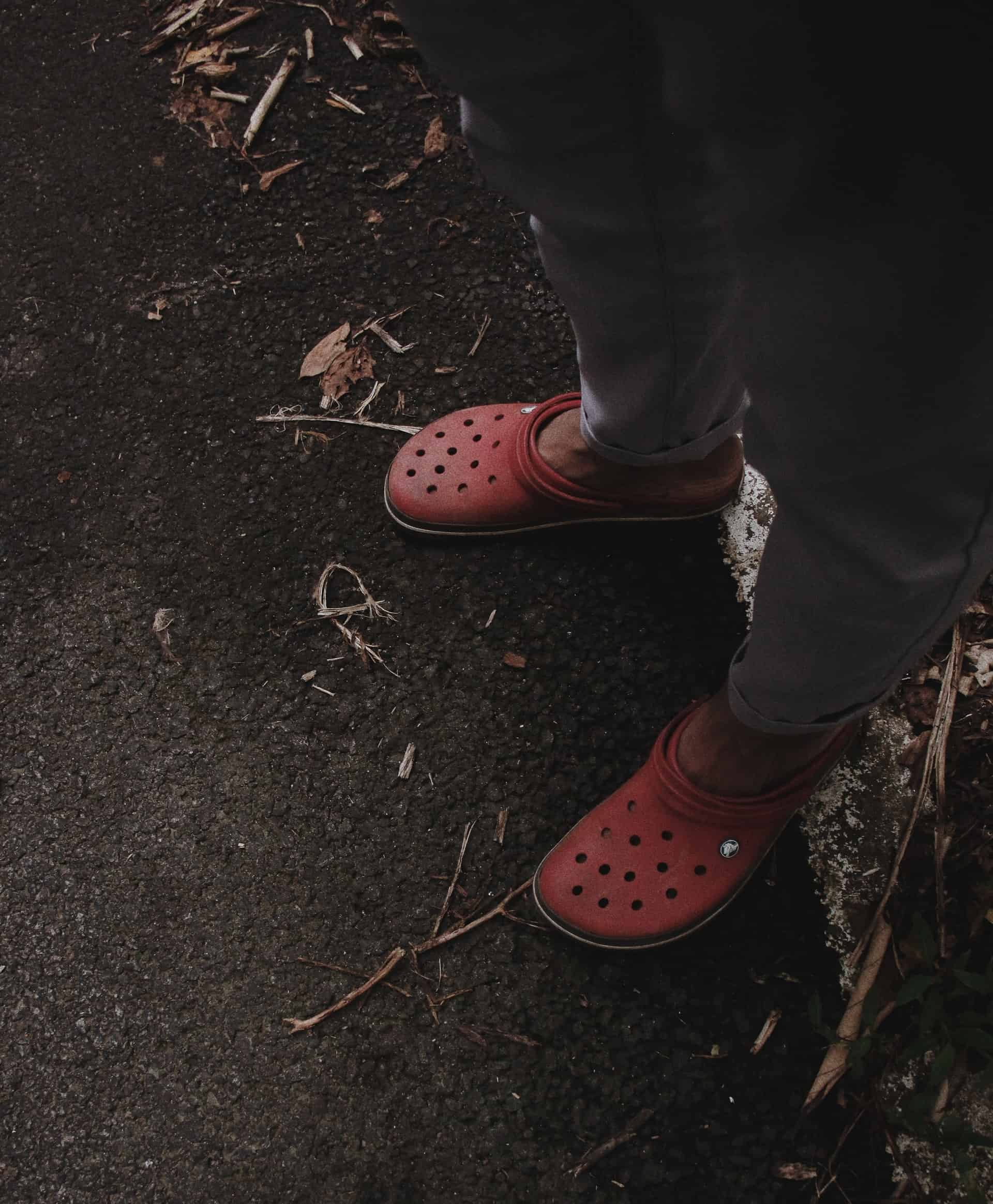With the growing popularity of Crocs as a casual shoe, you may have wondered if you can wear them hiking on the trail.
There are vague stories of people crushing the Appalachian Trail and other hard hikes entirely in Crocs, but it may not be the best idea for everybody. Read on if you want to see the merit of taking Crocs on the trail, and if it’s the choice for you!
Crocs are a fine choice for short hikes and river crossings, but on longer, harder hikes they are a poor choice. If you’re doing something like heading to a swimming area or going on a casual hike and that’s all you’ve got, they’ll do just fine.
While some people may have used Crocs on some more hardcore hikes, that does not mean it’s a good choice for everyone.
You’ll have a high likelihood of slipping, dirt, and debris will have a higher chance of getting into your shoe, and the soles are thin so you may potentially hurt your feet if anything sharp on the ground pokes through the sole.
They also offer no ankle support, and your feet will likely slip around inside the shoe. This can potentially cause things like blisters.
Crocs history
Crocs were born in 2002 when 3 friends were sailing in the Caribbean, and they witnessed foam sailing clogs for the first time. Scott Seamans, Lyndon Hanson, and George Boebecker Jr. came across the Canadian company Foam Creations’ product and quickly began to discuss ways to improve the design.
The shoes used a material called Croslite, and by 2004 they had secured the rights to the technology. The 3 split their work, with Seamans working on the design, Boebecker bringing in investors, and Hanson managing operations.
The inaugural Croc shoe, “The Beach” was launched, and the shoe began to move beyond its origins as a sailing product. Crocs expanded their styles, began to acquire footwear and accessory companies, and expanded into the behemoth they are today.
Crocs is also a notably environmentally conscious company. While they are manufactured with EVA foam, making them not entirely sustainable, Crocs are low in energy usage in production, and their packaging has been dramatically reduced to combat waste in landfills.
The company is also attempting to progress and become more eco-friendly. They are currently aiming to become net-zero carbon by 2030 and provide bio-based products by 2022. Crocs also has a donation program called “Crocs Cares”.
They donate a pair roughly every minute, and over 3 million Crocs have gone to people in impoverished nations.
Can you hike in crocs
While you can hike in Crocs, just keep in mind that they are far from the best choice. It’s a similar situation to attempting to hike in Doc Martens or converse.

There are plenty of breathable, comfortable shoes that are made to be used on the trail and work great in the water. Crocs can easily slip, become filled with debris, and they won’t offer a good fit to prevent friction and blisters on your feet.
also read: Are Chacos Good for Hiking?
There’s also a good chance they could be damaged if you’re hiking in a rugged area, as they are not constructed to be especially strong. They make a great camp shoe, or something to wear when in the water, but even then you may slip and fall.
If I were to make a recommendation, I would say Crocs are better in camp or around town than on a hiking trip. Below is a list of qualities that most traditional hiking shoes or boots would offer:
- Traction
- Ankle support
- Durability
- Protective qualities
- Comfort
- Waterproof or water-resistant
- Reasonable weight (Varies in heavier-duty versus lightweight designed models)
While this will vary based on model and style, Crocs come up short in most of these areas.
If you’ve got nothing else with you and only plan to make a short trip, you may not have any problems. Impromptu adventures happen, and it’s alright to have less than ideal footwear.
If you plan on doing anything above 5 miles, or anything with especially hilly and rugged terrain, then it may be time to hang the Crocs up and grab a pair of trail shoes or hiking boots.
I’ve heard stories of people using Crocs on hardcore hiking trips that people can’t make in the best of gear, but for most people, Crocs are far from ideal hiking footwear.
Pros and cons of hiking in Crocs
Pros
Cons
I find the most notable problem with hiking in Crocs is the lack of protection offered. With holes on the upper section of the shoe and thin construction, you aren’t given much protection compared to most hiking footwear.
This will be alright in some areas, but especially rocky terrain will be an issue if you’re wearing the foam clogs on a hike.
If you need to venture off-trail, things like thorns can easily become an issue. If you plan to wear your Crocs hiking, I recommend making sure that the area has established, maintained trails to avoid potential injures.
Also Read: Are Duck Boots Good for Hiking?
When can I hike in crocs
I’ve rattled on about how poorly Crocs fare for the average hiker, this does not mean that they won’t work for you. Like anything, the essential consideration for choosing your hiking footwear is making sure it works for you.

Crocs are not a great choice for most hikers, but if you feel comfortable in your Crocs on a hike, then that’s great!
There are plenty of more suitable options, but if you want a good shoe to wear around camp, along a shore, or wading in the water, then few options can compete.
My recommendation would be to only wear Crocs if you’re hiking less than about 5 miles, and you’re on well-maintained and level trails.
Even better if there’s water involved and you aren’t planning on any slick, sketchy crossings. In this scenario, you’re able to avoid many of the problems you would run into when wearing Crocs on a hike, and they’ll perform at their best.
what type of Crocs good for hiking?
If you’re set on taking Crocs on your next hiking trip, then at least go for the best model. The “Classic All-Terrain Clog” still isn’t the ideal hiking shoe, but it has features that will be more suitable for the trail.
It has a rugged lug outsole that offers greater traction than other models, as well as an adjustable heel strap so they will slip on your foot less than other styles would.
They also feature an odor-resistant interior, alongside the traditional, easy-to-clean features of Crocs. The all-terrain model also has a roomy toe box, so if you struggle with width in your shoes it may help you out.
This does not address all of the problems Crocs pose as a hiking shoe, but it at least offers more suitable options than a traditional Croc. This style should reduce the chances of blisters, and the added lug sole will offer more traction.
It’s still not comparable to a hiking boot or shoe, but it’s better than nothing. Several color options are available, so you can match your hiking gear to your hiking Crocs shoe.
They run a bit more expensive than a regular pair, but the extra features may be worth it to you. Some reviews say that the adjustable strap is not durable, and they run large in size, but I encourage more research before you commit to a product.
Are there any alternatives to Crocs?
While Crocs may not be the ideal option for hiking, many notable alternatives provide more protection and comfort.
Plenty of outdoor companies offers sandals and shoes that work great on outdoor adventures. Looking into hiking sandals or shoes that are made to be taken on the trail and worn in the water will provide many alternative options that are more suitable.
I’m going to list some options, but keep in mind that there are plenty of choices on the market. I recommend trying on several choices, and picking based on what works best for you.
- Chaco sandals
- Teva sandals
- Xero trail sandals
- KEEN Newport sandals
- Merrell Hydro Moc and other sandal options
- Columbia drainmaker sandals
Many of these companies offer numerous options to try, I’ve just listed some popular and well-known models and brands to start researching.
I also like to recommend that you look out for what people in your area or sport are wearing, you’ll see a lot of options that work great for your preferred activities and are suitable for where you live or plan to hike.
Oftentimes the people who know what shoes or gear work for an activity or location are the people who frequent it.
Someone hiking in the desert probably won’t wear Crocs, but maybe if you frequent a hiking spot with lots of water you’ll see a few pairs.
Conclusion
For me, taking Crocs on a longer hike just seems like a bad idea. The cons are so much more notable than the pros, and they don’t seem to have any redeeming qualities for tough hiking or backpacking.
However, I’ve taken shoes like Vans on impromptu hikes before, so I can’t talk too much. The most important thing when choosing hiking footwear is making sure that they are comfortable to you, and that they will hold up to the rigors of your activity.
Personally, I lean in the direction of wearing hiking boots, but you may love sandals or Crocs. No one can tell you what works best for your needs.
If you want to wear your Crocs on an adventure, big or small, go for it if you’re comfortable with the potential issues that may come up.
Maybe you’ll even be the person to verify the myths and legends of people taking down the Appalachian Trail in nothing more than a pair of Crocs. If it works for you, throw them in sport mode and get going!
For more related guides read my other posts:
About the Author

Hussain is a passionate hiker and traveler that love the outdoor and enjoys what nature has to give, whenever he can he love to write and give tips & honest reviews to help others get out there and just seek more unforgettable experiences.

